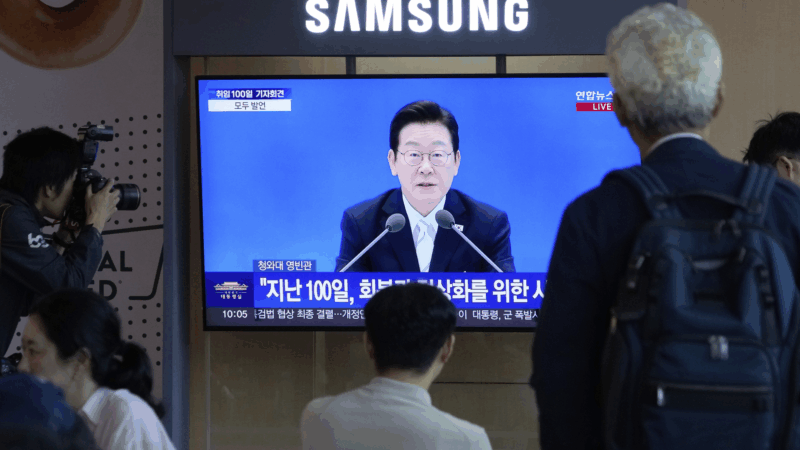South Koreans arrested in U.S. immigration raid being sent home
SEOUL, South Korea — U.S. immigration authorities are preparing to send more than 300 South Korean workers home on a chartered flight from Atlanta, a week after detaining them for allegedly working illegally, while constructing a South Korean-invested electric vehicle battery plant in Bryan County, Ga..
The sight of Immigration and Customs Enforcement (ICE) agents handcuffing and chaining the wrists, waists and ankles of skilled technicians shocked South Koreans.
It also threatened to become an obstacle to South Korea’s contribution to President Trump’s plans to revive American manufacturing.
“This could significantly impact future direct investment in the US,” South Korean President Lee Jae-Myung warned at a press conference, just over two weeks after a summit meeting with President Trump, in which the two pledged to step up economic cooperation.
Lawmaker Yoon Hu-duk put it more bluntly in a parliamentary hearing, saying: “The U.S. has encouraged investments in negotiations. And then it stabbed us in the back, to be frank.”
The charter flight’s departure from Atlanta was delayed while U.S. and South Korean officials hammered out the terms of the workers’ release.
Following a meeting with Secretary of State Marco Rubio, South Korean Foreign Minister Cho Hyun said that the U.S. had agreed to two of Seoul’s key demands.
One was that the workers be transported from a detention facility to the Atlanta airport without handcuffs or other physical restraints. The other was that the workers “will face no problems reentering the United States in the future to work,” Cho told reporters.
The two sides had initially disagreed over whether the workers would be allowed to leave voluntarily, or be deported, which could make it difficult for them to return to the U.S.
The seemingly businesslike resolution of the incident stands in contrast to the stark terms used by U.S. authorities, with the Department of Homeland Security Investigations calling the raid its biggest enforcement operation ever at a single site.

President Trump defended the detention of the workers, saying “I would say that they were illegal aliens, and ICE was just doing its job.”
The more than 300 South Koreans were among some 475 arrested in the raid.
Analysts note that while South Korea was the biggest foreign investor in the U.S. in 2023, this is a recent development. Other nations, including Singapore and Australia, which have free trade agreements with the U.S., have negotiated visa quotas for their skilled workers. South Korea is playing catchup, and does not yet have such a visa quota. The two governments say they will work to resolve this situation.
From a broader perspective, the incident stems from “a clash between the U.S. state and federal governments, which are hungry for foreign investments, and the immigration agencies and the American public, who see illegal employment and immigration very negatively” says Jang Sang-sik, head of the International Trade Research Institute at the Korea International Trade Association, a private trade lobby group.
“Manufacturing is different from the service industry,” says Hur Jung, a professor at Sogang University, and president of the Korean Association of Trade and Industry Studies.
“It needs not only capital but also a massive amount of labor and skilled technicians. I think that, in its push to reinvigorate manufacturing, the U.S. focused too much on capital, while neglecting the labor part.”
The high-tech factory is part of a $7.59 billion investment by South Korea’s Hyundai and LG corporations. Hur says that highly skilled South Korean technicians and engineers are needed to get the plant up and running, but after that, American workers will operate it.
Because the U.S. gives South Korea no visa quota for skilled workers, South Korean technicians have been traveling to the U.S. on short-term visas as a workaround.
South Korea is a leader in high-tech industries in which the U.S. is competing with China, including electric vehicles, batteries and semiconductors.
It also hosts the largest U.S. military base outside the continental U.S., and the only U.S. bases on the northeast Asian continental mainland.
But Jang Sang-sik notes that South Korea also has plenty of reasons to tone down its criticism of the U.S. raid on its factory.
“South Korea has a lot to ask from the U.S., even besides lowering tariffs,” Jang says. “There’s countering the threats from China and North Korea, and the possible withdrawal of U.S. forces” from South Korea.
Jang says that if the U.S. and South Korea properly handle the factory raid incident, it could even encourage South Korean companies to expand economic activities in the U.S.
NPR’s Se Eun Gong contributed to this report in Seoul.
A new one-a-day-pill holds promise for HIV’s ‘forgotten population’
It's designed to take the place of complicated, multiple drug regimens that many people with HIV need to follow. And it's also beneficial because the HIV virus is always evolving.
For filmmaker Chloé Zhao, creative life was never linear
Director Chloé Zhao used meditation, somatic exercises and dance to inspire the cast and crew of this Oscar-nominated story about William Shakespeare's family.
10 new books in March offer mental vacations
March is always a big one for books – this year is no different. We call out a handful of upcoming titles for readers to put on their radars — offering a good alternative to doomscrolling.
Sen. Chris Coons, D-Del., talks about the war with Iran and upcoming war powers vote
NPR's A Martínez asks Delaware Democrat Chris Coons, a member of the Senate Foreign Affairs Committee, about the war with Iran.
The candy heir vs. chocolate skimpflation
The grandson of the Reese's Peanut Butter Cups creator has launched a campaign against The Hershey Company, which owns the Reese's brand. He wants them to stop skimping on ingredients.
Scientists make a pocket-sized AI brain with help from monkey neurons
A new study suggests AI systems could be a lot more efficient. Researchers were able to shrink an AI vision model to 1/1000th of its original size.







